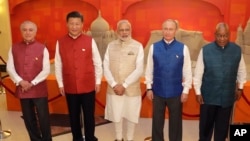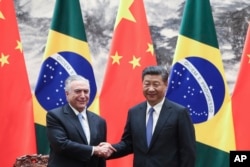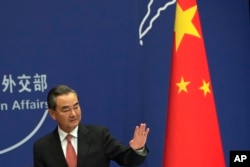China on Sunday hosts the annual summit of leaders from the BRICS countries — the emerging markets of Brazil, Russia, India, China and South Africa. They represent 40 percent of the global population, and observers say the talks are aimed at showcasing the nations' combined economic might as a counter to Western domination of world affairs.
As host, China hopes to make the meeting in the southeastern city of Xiamen a landmark event. However, it is hamstrung by sharp differences among member countries on several issues, as well as lurking suspicions that China is using the Beijing-headquartered group as a platform to advance its political and business interests.
"There is no doubt that Beijing senses an opportunity to burnish its credentials as the 'sole champion' of globalization and multilateralism at a time when the United States, under the Trump administration, seems to be turning inward and away from multilateralism," Mohan Malik, a professor at the Asia-Pacific Center for Security Studies at Honolulu, told VOA in an emailed response. "Lacking friends and allies, Beijing is keen to set up as many multilateral forums and financial institutions as possible to bring small- and medium-sized developing countries into its orbit."
Some in China believe that the BRICS platform offers an opportunity to push for these causes and perhaps enhance Chinese President Xi Jinping's image as a world leader. The question, however, is whether Russia and India, which have an array of differences with Beijing, are interested in it.
Internal squabbles
Analysts note that Moscow has serious reservations about China's Belt and Road Initiative, an infrastructure development project making progress in central Asia, where Russia has plans to implement a similar program, called the Eurasian Economic Union. Separately, China and India have had their disagreements.
This past week, the two Asian giants carefully backed down from one of their biggest disagreements in the Himalayan region in years, agreeing to de-escalate a 10-week-old standoff on their disputed border. India did not confirm that Prime Minister Narendra Modi would attend the Xiamen summit until after the agreement was signed.
Recent years have seen China taking the lead in establishing or expanding homegrown international organizations where Western countries have little or no role. Beijing has also ensured that these organizations are headquartered in China.
In addition to BRICS, there is China's National Development Bank, the Asian Infrastructure Investment Bank (AIIB), and the Shanghai Cooperation Organization (SCO).
BRICS Plus
More recently, China has been pushing a new proposal of BRICS Plus, which aims to bring non-BRICS countries into the organization.
China argues that doing so would strengthen the organization and make it a more potent force.
"BRICS is not an exclusive club. The impact of BRICS cooperation reaches far beyond the five countries," said Foreign Minister Wang Yi at a recent press conference in Beijing. "I believe the BRICS Plus model will fully release the vitality of BRICS cooperation."
Not everyone sees the proposal the same way, and it has met with stiff resistance and suspicion.
"China wants to be the leader of the organization, and the other four may not agree and that is why China is pushing to recruit more members," said Oliver Rui, a professor of finance and accounting at the China Europe International Business School.
Some say China's push to expand the organization is aimed at strengthening its position in BRICS, instead of making it stronger.
"Wang Yi's idea of inviting other developing countries to join the partnership under the BRICS Plus concept would potentially unravel BRICS and transform it into just another SCO-like bloc, led and dominated by China [and Russia], that is likely to be anti-West in orientation and bolster Chinese leadership and serve Chinese interests," Malik said.
For now, Beijing has been forced to abandon its effort to formalize the idea at the Xiamen summit, which begins Sunday and wraps up Tuesday.
Still, Foreign Minister Wang said China would stick to BRICS' existing practice, which allows the host nation to invite other countries to the summit as a one-time opportunity. He also said that more would be done to help explain BRICS Plus and the rationale behind the idea.
BRICS without mortar
With a divide over expansion and a lack of clarity over the role the organization should play — whether it should have an economic or political agenda or both — some feel BRICS has yet to find that bonding element to hold the five countries together.
"I think the BRICS is kind of falling apart, due to many different kinds of reasons," Rui said. "First, these five countries, naturally, they should not be a part of one organization."
The group is not a trade bloc capable of influencing trade flows and decisions in the World Trade Organization. And the organization's partners often complain of a huge trade balance in favor of Beijing because Chinese business tends to sell a lot more than it buys from these countries.
Beijing, however, is optimistic.
At the press conference, the Chinese foreign minister defended BRICS, saying that it reflects the aspirations of emerging markets and works for strengthening their economic situation. "It also plays an increasingly important role in promoting international peace and development," he said.
VOA's Joyce Huang contributed to this report.









